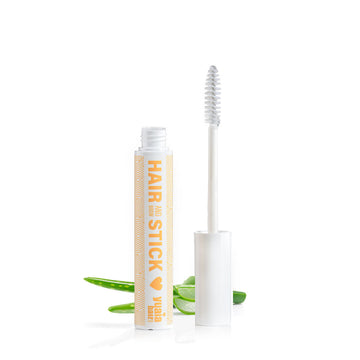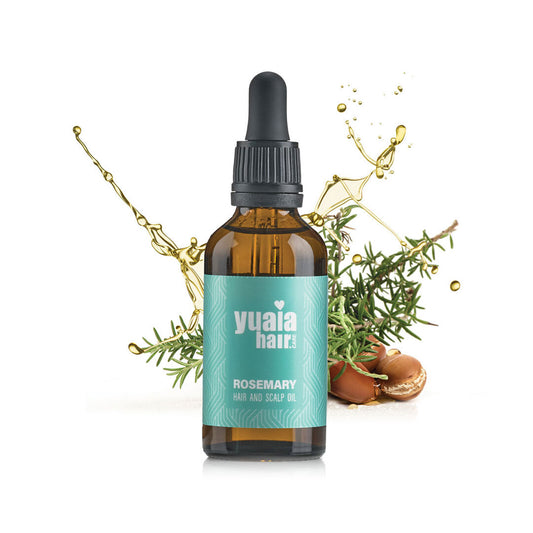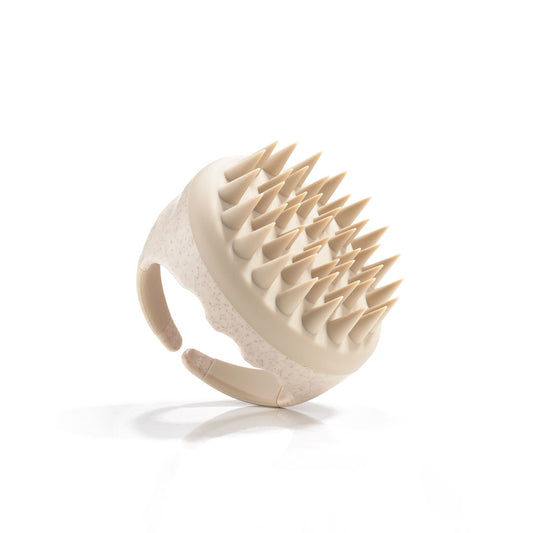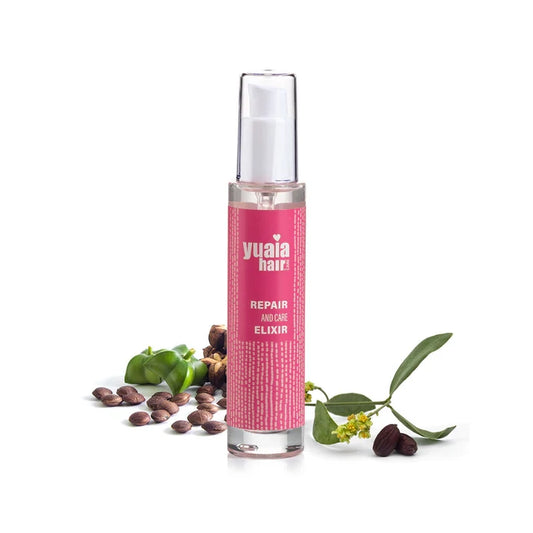Hair is one of the most important parts of the body and it is important to take good care of it to maintain its health and beauty. Hair oil is a natural and effective way to care for your hair and it has become popular with many people in recent years. But with so many different types of hair oil available, it can be difficult to know which one to choose. In this article, we will explore different types of hair oil and their benefits, as well as give you some tips on how to best use them.

Hair Oil - A complete guide to natural and effective hair oil

by Nanna Bundgaard | 09. April 2023 | Reading time: 13 minutes
Read more about the authorWhat is hair oil?
Hair oil is a natural oil that is made from various plant materials. It can be used to improve the health and appearance of the hair by providing it with nourishment and moisture. Hair oil is known to have a positive effect on hair by repairing damaged hair, strengthening hair and stimulating hair growth.

What does hair oil do?
Hair oil is a versatile product that offers numerous benefits for hair health. It helps moisturize and nourish the hair, preventing dryness and reducing frizz. By creating a protective barrier, hair oil can shield hair from environmental aggressors, heat damage, and breakage.
In addition to these protective qualities, hair oil can help smooth the hair cuticle, making it easier to detangle and style. Regular application can enhance shine, improve manageability, and even promote healthy hair growth by stimulating the scalp.
Try our hair test
The hair test gives you precise answers about which products are best for your hair type. Try it now 👇🏼
Try it now!Certain oils, such as castor oil and peppermint oil, are known for their ability to invigorate the scalp and encourage hair growth. Other oils, such as argan or jojoba, cater to specific hair types and concerns, making them an essential addition to any hair care routine. Using the right hair oil tailored to your specific needs can transform your hair from dull and lifeless to vibrant and healthy.
Types of Hair Oil
There are many different types of hair oil available, and each type has its own unique benefits. Some of the most popular hair oils include:
Argan oil
Argan oil is an oil extracted from the kernels of the Argan tree. This oil is rich in vitamin E and antioxidants that can help protect hair from damage and premature aging. Argan oil is also known to be a natural moisturizer that can help reduce dryness and brittleness in hair. Regular use can improve overall hair health, making hair feel softer and more manageable.

Coconut oil
Coconut oil is a popular oil known for its moisturizing properties. This oil is rich in fatty acids that can help repair damaged hair and prevent hair loss. It penetrates the hair shaft effectively, providing deep hydration and strengthening the hair from within. Coconut oil can also help reduce dandruff and scalp irritation. If you want to read more about coconut oil for hair, read along here.
Jojoba oil
Jojoba oil is a natural oil extracted from the seeds of the jojoba plant. This oil is known for its moisturizing properties and can help improve hair health and shine. Jojoba oil is also known to help prevent damage and protect hair from environmental factors. Incorporating jojoba oil into your hair care routine can lead to softer, more manageable hair. Read more about jojoba oil here.
Olive oil
Olive oil is a natural oil that is rich in antioxidants and fatty acids. This oil can help moisturize hair and prevent damage. Olive oil can also help reduce dandruff and scalp irritation. Read more about olive oil for hair here.

Almond oil
Almond oil is a natural oil extracted from almond kernels. This oil is known to have a positive effect on hair growth and health. Almond oil can also help reduce dryness and brittleness in hair and improve hair shine. Its lightweight consistency makes it suitable for all hair types, providing hydration without weighing hair down. Read more about almond oil for hair here.
Rose oil
Rose oil is a natural oil extracted from rose petals. This oil is known for its soothing effect on the scalp and can help reduce irritation and inflammation. Rose oil can also help improve hair health and shine. Using rose oil as part of your hair care routine can enhance both the texture and appearance of your hair.
Tea Tree Oil
Tea Tree oil is a natural oil known for its antibacterial and antifungal properties. This oil can help reduce dandruff and scalp irritation as well as prevent infections in the hair follicles. Tea Tree oil can also help stimulate hair growth and improve hair health.
How to use Hair Oil?
There are several ways to use hair oil and it depends on the type of oil you choose.
What do you look for in a hair oil?
Use as a scalp massage
One effective way to use hair oil is to massage the oil into the scalp. This method not only helps to hydrate the scalp but also promotes blood circulation, which can enhance hair growth. Apply a few drops of your chosen hair oil directly to the scalp and use your fingertips to gently massage it in. Leave the oil on for a few hours or overnight before washing your hair. This can help reduce scalp dryness and irritation as well as improve hair health and shine.
Use as a conditioner
Another way to use hair oil is by adding a few drops of oil to your regular conditioner and applying it to the hair after shampooing. This technique enhances the moisturizing properties of your conditioner, allowing for deeper hydration and nourishment. This can help to moisturize and nourish the hair as well as improve the health and shine of the hair.
Use as a hair mask
Hair oil can also be used as a hair mask by applying the oil to the hair and leaving it on for 30-60 minutes before washing the hair. This treatment allows the oil to deeply penetrate the hair shaft, providing intense hydration and nourishment. it can help repair damaged hair and improve hair health and shine.
For best results, warm the oil slightly before application to increase its effectiveness and make it easier to spread.
Is it best to use hair oil on damp or dry hair?
Using hair oil can be effective on both damp and dry hair, but each method serves different purposes. Applying hair oil to damp hair allows for better absorption of the oil, sealing in moisture and enhancing hydration. This method can help smooth frizz and improve the overall texture of the hair.How to choose the right Hair Oil?
When choosing a hair oil, it is important to consider the needs of your hair type and the desired effect. If you have dry or damaged hair, consider an oil with moisturizing properties such as coconut oil or argan oil. These oils penetrate the hair shaft effectively, providing deep hydration and repairing damage.
If you have oily hair, consider a lighter oil such as jojoba oil or tea tree oil. Jojoba oil closely resembles the natural oils produced by the scalp, making it ideal for balancing oil levels without adding excess greasiness. Tea tree oil, on the other hand, can help with scalp issues like dandruff due to its antibacterial properties.
It's also beneficial to think about specific hair concerns. For example, if you're looking to promote hair growth, consider oils like castor oil, known for its ability to strengthen hair follicles.
Hair oil is a natural and effective way to care for your hair. There are many different types of hair oil available, and each type has its own unique benefits. By choosing the right type of hair oil and using it correctly, you can improve the health and appearance of your hair.
From Ancient Secrets to Modern Must-Have: The Journey of Hair Oils
Hair oils have been used since ancient times for hair growth. They were a simple yet effective solution to maintain healthy hair. And people have wondered: what oil is good for hair growth? Today, the use of hair oils has evolved. There is a wide variety of oils available to cater to different hair types and concerns.
Today, we will explore the fascinating journey of hair oil. We will also discuss how to use hair oil.
- Ancient Usage: The Early Days of Hair Oils
Hair care has a long history. In ancient Egypt, people used olive oil and castor oil to nourish and protect their hair. They even added fragrant resins and flowers for a pleasant scent! In India, Ayurveda, a traditional medicine system, used coconut oil and amla oil for hair health.
- Medieval Times: Hair Oils Get Creative
Hair oils have been used for centuries to nourish and beautify hair. The Middle Ages saw hair oils get more interesting. In Europe, people used rosemary oil and lavender oil to stimulate hair growth and add shine.
- Modern Use: Research on Hair Oil
Science stepped in during the 19th and 20th centuries. Researchers studied the benefits of fatty acids and vitamins in hair oils. They created more hair oil blends for different hair types and concerns.
- Hair Oils Today
Hair oils are back in a big way! From argan oil to jojoba oil, there's hair oil for everyone. Hair oil benefits are well-known. It adds moisture, reduces frizz, and promotes shine. You can use hair oil to care for your locks and add life to it.
- The Future of Hair Oils
Hair oil innovation is booming. New carrier oils and essential oil blends are constantly being developed. There's also a focus on sustainability. Many brands now offer organic and ethically sourced hair oils.
Benefits of Using Hair Oils
There are many benefits of using hair oil. Here are some of those.
- Hair oils can help moisturize and condition the hair
- Hair oil reduces hair dryness and frizz
- They can help strengthen the hair
- It reduces breakage and split ends
- Certain oils, like coconut and argan oil, are known for their ability to promote hair growth
- Hair oils can add shine and luster to dull, lifeless hair
Incorporating hair oil into your routine can significantly improve the overall health and appearance of your hair, making it look vibrant and well-nourished.
How Often Should You Oil Your Hair?
So, if you are wondering about the frequency of using hair oil, here is what you need to know. The ideal hair oiling frequency depends on your hair type, scalp condition, and personal preference. Here are some general guidelines:
- Dry Hair: If you have dry hair, you can oil your hair 1-2 times a week to help moisturize and nourish it.
- Normal Hair: For normal hair, oiling your hair once a week should be sufficient to maintain its health and shine.
- Oily Hair: If you have oily hair, you may want to oil your hair less frequently, around once every 2 weeks, to avoid making your hair look greasy.
- Scalp Conditions: If you have scalp conditions like dandruff or itchiness, you can oil your hair more frequently.
- Length of Hair: The length of your hair can also determine how often you should oil it. Longer hair may require more frequent oiling to moisturize the ends.
Ultimately, listen to your hair’s needs and adjust the frequency accordingly for the best results.
How to get the Benefits of Hair Oil
Hair oil is a great addition to your hair care routine. Here are some tips for using hair oils effectively:
- Choose the right oil: Consider your hair type and needs. Coconut oil is great for dry hair, while jojoba oil is good for oily hair.
- Do not use it in excess: A little oil goes a long way. Start with a few drops and apply to the ends of your hair. And then work your way up.
- Warm it up: Gently warming your hair oil before use can help it penetrate your hair better.
- Scalp massage: Apply oil to your scalp and massage gently to improve blood circulation.
- Frequency: Oil your hair once or twice a week, depending on your hair type and climate.
So, next time you wonder what oil is good for hair growth, remember, hair oils are a time-tested tradition with a modern twist. There's a perfect hair oil out there for you, waiting to be discovered!

5 Unique FAQs about hair oil
1. Can I use hair oil every day?
Yes, you can use hair oil every day if necessary to achieve the desired result. However, it’s crucial to choose the right type of oil that suits your hair type and needs. For example, lighter oils like argan or jojoba are suitable for daily use, while heavier oils may require less frequent application to avoid buildup. Always apply a small amount, focusing on the ends to prevent greasiness and maintain a balanced look.
Get a 10% discount code sent to you
Receive the best tips and tricks for your hair from Lotte and Nanna 🥰
2. Can I use hair oil on my colored hair?
Yes, you can use hair oil on your colored hair, but it is important to choose an oil that will not affect your hair color or cause unwanted discoloration. You should also consider reducing the amount of heat styling and coloring as this can dry out the hair.
3. Is it necessary to use a certain amount of hair oil?
It depends on the needs of your hair type and the desired effect. In general, it is recommended to use a few drops of oil for short or medium length hair and up to a tablespoon for long hair. It is important to avoid using too much oil as this can lead to oil build-up in the hair. Always start with a small amount and gradually increase as needed to find the right balance for your hair. Using the right amount will ensure your hair stays healthy and manageable without appearing greasy.
4. Is hair oil suitable for all hair types?
Yes, there are different types of hair oil to suit different hair types and needs. It is important to choose the right type of oil for your hair type's needs and use it correctly to achieve the desired results.
5. Can hair oil help prevent hair loss?
Some types of hair oil can help stimulate hair growth and improve hair health, but it's important to remember that hair loss can be caused by a variety of factors, including genetics, stress and hormonal imbalances. If you experience significant hair loss, you should seek advice from a doctor or specialist to address the underlying issues.
 2-5 day delivery
2-5 day delivery
 25.000+ satisfied customers
25.000+ satisfied customers
 Satisfaction Guarantee
Satisfaction Guarantee



























